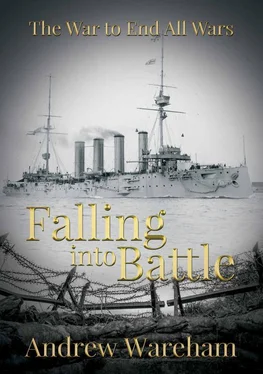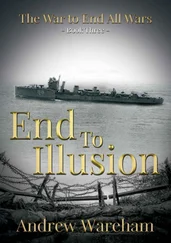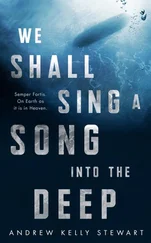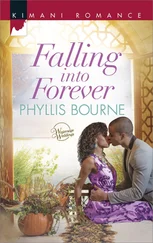“Horsemen, sir. With long stickers. Lancers, sir. They ain’t ours.”
“Fall back to the houses.”
Corporal Abbott whistled as they entered the village street, perhaps a hundred yards from the bridge, up the hillside and safe from flooding in a wet season.
“The men are behind the fences, sir, and in the windows looking over the road. Sergeant Grace has got Corporal Ekins up at the railway, sir.”
“Have you got Pickford with you?”
“No, he’s found himself a bit of a nest up at the pitheads, sir. Going to be sniping from there, sir. Reckon ‘e’s got a dozen already today, sir.”
There was a note of respect in Abbott’s voice, but a degree of distaste as well. Pickford was too much of a killer for the rest of the platoon to be easy with.
“They old Uhlans is coming down the hill, sir. Going across the slope, not straight down, like, but they looks as if they might be coming down to the bridge. Walking it, sir. They ain’t pushin’ they horses.”
“We need another five minutes, the way the fuses are burning.”
“It ain’t as if they were charging, sir. Reckon they’re going to give us a few minutes in hand. So long as we keep out of sight and they ain’t got no reason to chase after us. Old Pickford’s going to stir ‘em up a bit, mark you, if so be ‘e cuts one or two down.”
“Do you know where he is, exactly?”
“Not to say precisely, like, no, sir.”
Nothing to be done other than hope that the lances would not be moved to charge the sniper who was killing them, if they worked out which direction he was firing from. They were a quarter of a mile distant, just cutting back on themselves, zigzagging down the hillside, giving the horses an easy passage downslope.
“How many would you say, Abbott?”
“A lot, sir. They’re in eight companies – or troops or squadrons, whatever it is you calls cavalry, sir. Maybe forty or fifty in each. Got to be a whole regiment of ‘em, horsemen having smaller battalions than foot.”
“Well, we don’t want a charge of a light brigade on top of us, Abbott. Let’s hope the bridge blows in time.”
“Smoke from the fuses is out of sight, sir. Gone down the holes.”
“About ten feet in a minute, and five feet to go… Any time now, I make it…”
The seconds dragged by, the lancers walking closer, making no attempt to hurry, unaware of any force to their front.
Pickford fired a first round and a lancer with chevrons on his sleeve dropped over the crupper of his horse and then rolled to the ground.
“Goodbye to one sergeant – good target to pick. They’re green, those Uhlans!”
The horsemen had halted, clustering around the fallen man rather than dashing for cover.
Pickford fired four more shots, one carefully aimed and three into the mass of scattering men as they realised their error. Two more fell. A section of eight charged onto the foot of the bridge, running for cover more than choosing their direction.
The first cartridge blew, a coughing, low-pitched explosion; earth spurted out from under the right side of the bridge and a few bricks tumbled, bouncing over the towpath and splashing into the water. The other five followed in the space of two seconds, throwing dirt into the air and scattering bricks from the roadbed and underneath the parapets. The bridge lurched and slipped sideways, the brickwork cracking apart, all very slowly, slumping rather than dramatically collapsing.
“She’s gone, sir… crumbling she is, the keystone’s going, sir, look!”
The archway twisted and dropped with a massive splash as the brickwork lost its cohesion.
Two horses screamed as they fell forwards, the roadway disintegrating under them.
“Aim at those horsemen, Abbott. Ready? Five rounds, rapid… Fire!”
The cavalrymen suddenly realised they were in danger, heaved the horses’ heads round and fled back up the hill, leaving a dozen behind, men and mounts alike.
“Well done, Abbott. Be ready to fall back without warning. Most likely, they’ll bring their field guns to the top of the hill and try to blow the village to bits.”
Abbott nodded, inspecting the remains of the bridge and trying to work out from a distance whether a man could scramble across dry foot, jumping from one bit of rubble to another.
“Permission to put them horses out of their misery, sir? Can’t abide that screaming, nohow.”
“Do it.”
Abbott and half of his platoon scuttled down to the bridge and gave each other a hand across. Richard watched as they put their rifles to the horses’ heads, offering them mercy that was denied to their riders who lay equally gravely wounded and with as small a chance of living.
“Thought as much!”
The soldiers were quickly running their hands through pockets and saddlebags and coming away with the small valuables and hard rations the horsemen carried. They ran back, grinning.
“Got one of them pointy helmets of theirs, sir! Send it back to the missus to put on the wall. Got their badges as well, sir, to tell what regiment they was.”
“Sensible, Abbott. The colonel will appreciate that, to take back to the general for his staff. Anything else?”
“One of them funny pistols, sir, and ammo for it what is in clips like we use for the rifles, sir. Old Grindley got that. They got a load of baccy, sir. Pipe stuff, all of them carrying that. Enough for a month, I reckon. Left their short rifles, sir – no use to us. Some of they got good boots, but it didn’t feel right, pinching they off their feet.”
Abbott made no mention of oddments of silver coinage and rings and a single watch and chain – they were none of an officer’s business.
“Lay up for the night behind the railway track. Better not use the houses – might be the guns will target them first thing in the morning.”
A fortnight of chasing up and down the coast, mostly at night, navigating from shoal to shoal and from one known minefield to the next and aware all the time that the mines, both British and German, themselves were unreliable, that every field had a few that had dragged their moorings a cable or two, or might have become completely unshackled and be floating miles distant from their intended location.
The lookouts were doubled - and could see little in the dark of the moon and not much even when it was at full. The searchlight flashed a dozen times each watch, checking possible sightings. Once, they had seen a mine and had exploded it with rifle fire, although that was to announce their presence to any ship within ten miles.
Apart from that one moment of excitement, they had seen nothing other than the flicker of artillery not many miles inland.
“What’s happening in France and Belgium, sir?”
“A damned good question, Sturton. Something.”
“Thank you, sir.”
“My pleasure. I am always happy to enlighten the ignorance of my junior officers.”
“There seems to have been activity at Ostend, sir.”
“Small parties from a Naval Brigade and the Army going in to evaluate the roads and railways in case they must assist at Antwerp, which is encircled by forts which are said to be impregnable, invulnerable and any other superlative you can think of. That means that Napoleon could certainly not have taken them. He, of course, did not have Krupp guns firing forty centimetre explosive shells. It is likely that the generals cannot count beyond five and therefore do not appreciate just how great such shells are.”
“Five, sir?”
Captain Smallwood held up his left hand and solemnly pointed with his right, ticking off the fingers.
“One… two… three… four… five. They have to stop there for not having another hand to count with. As all generals are fat and aged, they cannot reach down to their toes, which they have not seen in many years. Five is their limit.”
Читать дальше












